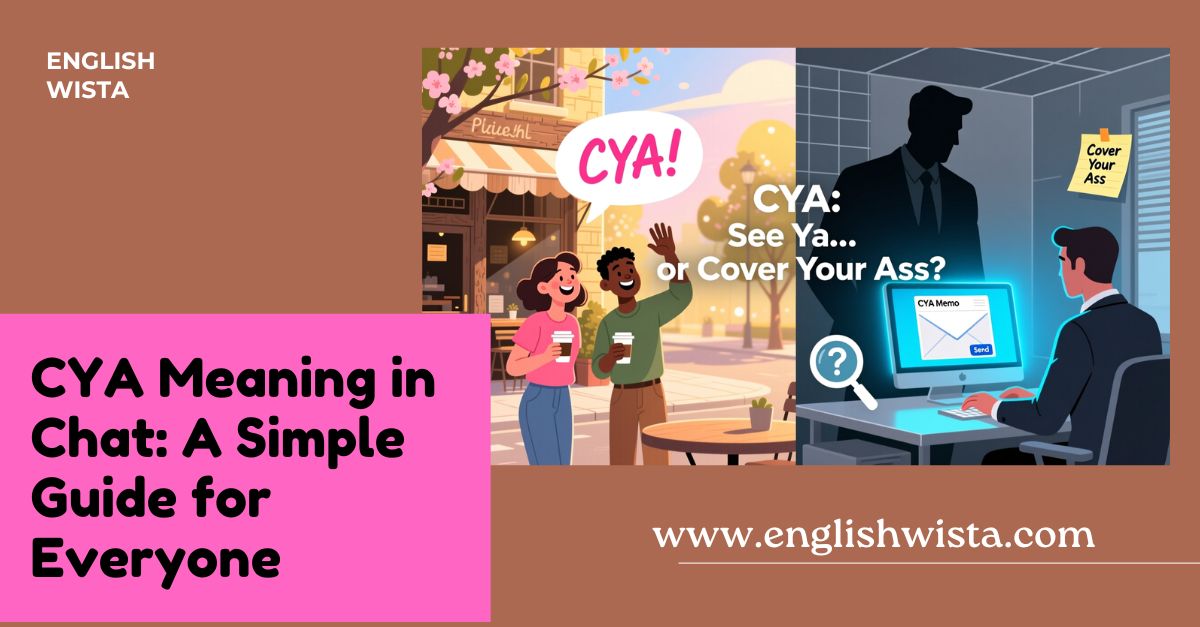Have you ever been chatting online, maybe with a friend, coworker, or even in a group chat, and suddenly someone types “CYA”? At first glance, it can be a little confusing. Does it mean something secret? Is it slang? Or maybe even a code?
Don’t worry you’re not alone if you’ve been puzzled by this. Online chats, text messages, and social media are full of short forms, acronyms, and abbreviations. Some are easy to guess, while others seem like a mystery.
In this article, we’ll break down exactly what CYA means in chat. We’ll explore the different ways people use it, clear up common confusions, and share lots of examples so you can confidently understand (and even use) it in your own conversations. Think of this as your friendly guide to decoding “CYA” once and for all.
What Does CYA Mean in Chat?
The most common meaning of CYA in chat is simply:
“See ya.”
It’s a short, casual way of saying goodbye. Instead of typing the full “see you,” people type “CYA.” It’s quicker, easier, and fits the fast pace of online chatting.
For example:
- Friend A: “Okay, I have to go eat dinner now.”
- Friend B: “Alright, CYA later!”
Here, “CYA” means the same thing as “see you later” or “goodbye.”
Why Do People Use CYA Instead of “See You”?
Great question! Let’s look at a few reasons:
- Speed and convenience – Typing “CYA” takes just three letters instead of two words. In quick chats, saving time matters.
- Casual tone – “CYA” feels informal and friendly, which is perfect for texting or casual online talk.
- Trendy internet language – People love abbreviations, and “CYA” has become one of those internet shortcuts.
Think of it like other common chat shortcuts:
- “BRB” = Be right back
- “LOL” = Laugh out loud
- “TTYL” = Talk to you later
“CYA” fits right in with these.
Is CYA Always the Same as “See Ya”?
Here’s where it gets interesting: CYA can mean different things depending on context.
Most of the time, especially in casual chat, it means “see ya.” But in professional or business settings, it can also mean something totally different:
“Cover your ass.”
Yes, that’s right. In workplace conversations or emails, “CYA” is often used as a warning. It means protecting yourself from blame or making sure you have proof if something goes wrong.
For example:
- Employee A: “I sent the client an email and copied the manager, just to CYA.”
- Employee B: “Smart move.”
In this situation, “CYA” has nothing to do with saying goodbye. It’s all about being careful and avoiding trouble.
How to Tell Which Meaning Someone Is Using
So, how do you know if “CYA” means “see ya” or “cover your ass”? The key is context.
- Casual chat with friends or family → Almost always means “see ya.”
- Work emails, professional chats, business discussions → Usually means “cover your ass.”
If you’re ever unsure, just look at the rest of the conversation. That will usually give you the answer.
Common Examples of CYA in Sentences
Let’s break it down with clear examples so you can spot the difference.
CYA = See ya (casual goodbye):
- “It’s getting late, CYA tomorrow!”
- “That was fun, CYA in class.”
- “Okay, gotta go, CYA.”
CYA = Cover your ass (professional or careful tone):
- “I saved all the receipts to CYA in case there are questions.”
- “Better keep a backup copy, just to CYA.”
- “She sent the report to the whole team to CYA.”
Variations and Similar Phrases
“CYA” isn’t the only way people shorten “see you.” You might also see:
- CU = See you
- CYL = See you later
- CUL8R = See you later (with numbers)
- TTYL = Talk to you later
- L8R = Later
All of these have the same casual goodbye feeling.
On the professional side, instead of “CYA,” some people might just say:
- “Cover yourself”
- “Play it safe”
- “Better safe than sorry”
But “CYA” is the popular shorthand.
The Origin of CYA
Where did “CYA” come from?
The “see ya” version has been around for decades. People started using “see ya” as a fun, shortened goodbye in spoken English long before texting existed. When digital communication became common, it naturally turned into “CYA.”
The “cover your ass” version comes from American slang. It became common in workplaces, especially in office culture, where people wanted to make sure they weren’t blamed for mistakes. Over time, it got shortened to “CYA.”
So, in short:
- Casual origin = friendly goodbye.
- Workplace origin = self-protection.
Is CYA Formal or Informal?
Most of the time, CYA is informal. You wouldn’t use it in a serious letter, an academic essay, or an official report.
- In texts, chats, or social media, it’s perfectly fine.
- In work emails, use the “cover your ass” meaning carefully. Some people may find it too casual or even unprofessional. If you’re not sure, it might be safer to write the full phrase instead of the abbreviation.
Fun Facts About CYA
Here are a few fun extras about “CYA” that you might enjoy:
- Double meaning joke – Sometimes people use “CYA” at the end of a chat, and it’s unclear if they mean “see ya” or “cover your ass.” It works as a funny play on words.
- Pronunciation – When spoken out loud, people usually say “see ya,” not the letters “C-Y-A.”
- Global use – While “CYA” is most common in English, internet users worldwide recognize it, thanks to movies, social media, and gaming.
- Pop culture – You might see “CYA” in memes, TV shows, or even as part of usernames in online games.
Should You Use CYA?
If you’re wondering whether you should start using “CYA,” here’s some advice:
- With friends and peers → Yes, go ahead! It’s casual, simple, and makes your chat look natural.
- With coworkers (informally) → You can use it if your workplace culture is casual and people are okay with slang.
- With your boss or in professional writing → Better to avoid it, unless you’re 100% sure it will be understood correctly.
Remember: tone and audience matter.
Quick Recap of Key Points
Let’s go over what we’ve learned, step by step:
- CYA in chat usually means “See ya.” It’s a friendly way to say goodbye.
- In professional settings, CYA can mean “Cover your ass.” This refers to protecting yourself from blame.
- Context is everything. Casual chat = “see ya.” Work talk = “cover your ass.”
- It’s informal. Great for friends, but not always for formal situations.
- There are fun variations. CU, CUL8R, and TTYL are similar expressions.
Conclusion
So, the next time someone writes “CYA” in a message, you won’t have to scratch your head. You’ll know whether they’re simply saying goodbye or giving a workplace warning.
Language keeps changing, especially online. Short forms like “CYA” show how people like to make communication fast, casual, and even a little playful. Whether you use it with friends as a cheerful goodbye or recognize it in an office email as a caution, you now understand the full picture.
In short: CYA = “see ya” most of the time, but sometimes “cover your ass” too.
And with that, I’ll sign off just the way we’ve been talking about
CYA next time!



